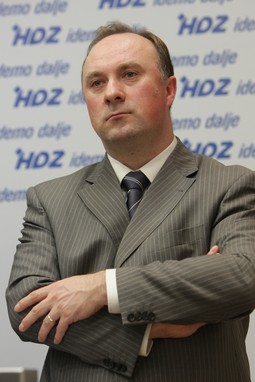Published in Nacional number 699, 2009-04-07
European Commission reject proposal to hand Uljanik over to Istrians
NEELIE KROES, the EC commissioner for competition policy has told Croatian Government that it cannot implement a separate privatisation model for Pula's Uljanik shipyard
 DAMIR POLANCEC, Deputy Prime Minister and Economy Minister, and the head of the Croatian negotiating team, can expect a great deal of discontent in Istria CountyThe European Commission again last week shook Croatia by introducing new conditions in the shipbuilding chapter in the accession negotiation process for EU membership. After three months of complete silence, the EC commissioner for competition policy, Neelie Kroes, told Croatian Government that Brussels does not accept three very significant Croatian demands regarding the privatisation of Croatian shipyards. This will create significant financial and internal policy problems for Croatia. That is why Government has not told the public about the new demands from Brussels. And, as bad news never comes alone, after the announcement from Zagrebacka Bank on the termination of the reprogramming of 6 billion kuna in debts from Croatian shipbuilding, which come due for payment in two months time, the EC administration has told Zagreb that the most successful Croatian shipbuilding company, Pula's Uljanik, cannot be privatised using a separate model, which was a key demand from Croatian Government, the Uljanik company and all of Istria County. Brussels is demanding that the year 2005 be taken as the start of the restructuring of the Croatian shipbuilding industry, which increases the obligations and the amount of money that has been spent to consolidate the shipyards to date that needs to be returned. The EC is now also challenging the compensation measures in the change of product line and services provided by shipyards, which will be a direct blow to the plans of the Kraljevica shipyard to build megayachts.
DAMIR POLANCEC, Deputy Prime Minister and Economy Minister, and the head of the Croatian negotiating team, can expect a great deal of discontent in Istria CountyThe European Commission again last week shook Croatia by introducing new conditions in the shipbuilding chapter in the accession negotiation process for EU membership. After three months of complete silence, the EC commissioner for competition policy, Neelie Kroes, told Croatian Government that Brussels does not accept three very significant Croatian demands regarding the privatisation of Croatian shipyards. This will create significant financial and internal policy problems for Croatia. That is why Government has not told the public about the new demands from Brussels. And, as bad news never comes alone, after the announcement from Zagrebacka Bank on the termination of the reprogramming of 6 billion kuna in debts from Croatian shipbuilding, which come due for payment in two months time, the EC administration has told Zagreb that the most successful Croatian shipbuilding company, Pula's Uljanik, cannot be privatised using a separate model, which was a key demand from Croatian Government, the Uljanik company and all of Istria County. Brussels is demanding that the year 2005 be taken as the start of the restructuring of the Croatian shipbuilding industry, which increases the obligations and the amount of money that has been spent to consolidate the shipyards to date that needs to be returned. The EC is now also challenging the compensation measures in the change of product line and services provided by shipyards, which will be a direct blow to the plans of the Kraljevica shipyard to build megayachts.
Certainly the biggest problem is the Commission's rejection of the separate privatisation model for Pula's Uljanik shipyard and their demand that the privatisation of Uljanik be carried out in the same way as at other Croatian shipyards. And that means privatisation by way of a tender and the sale of at least a 50 percent stake in the company stock.
And as Uljanik's market position, operations and results in Croatian shipbuilding are entirely different from those of 3 maj, Brodosplit and Brodotrogir, Uljanik's managers, led by Karlo Radolovic, drafted a model everyone in Istria County and Croatia accepted. A model whereby a 25 percent stake would be purchased by a strategic partner, a part bought up by Uljanik employees at the same discount that was valid for the INA oil company and Croatian Telecom, which would develop employee shareholding, and a part would go to the municipal and county governments in Istria County. By this separate model Uljanik would remain in the hands of the company's employees and managers and of the people of Istria, who would themselves chose a strategic partner. All current talks and interest have pointed to the possibility  THE EC COMMISSIONER for competition policy Neelie Kroes has further complicated Croatian accession to the European Union with her new conditionsthat Uljanik's strategic partner could be Danko Koncar, a successful businessman and ore merchant from South Africa. If that were not to succeed, Uljanik could choose its shipping company, Uljanik-plovidba, as a 25-percent strategic partner, which joined forces with Zadar's Tankerska plovidba company to buy the Viktor Lenac shipyard in Rijeka. Uljanik's operating results in 2008 – profits of 45 million kuna and 36 million kuna profits from the shipyard itself – confirm that the Pula shipyard is capable of launching its own privatisation.
THE EC COMMISSIONER for competition policy Neelie Kroes has further complicated Croatian accession to the European Union with her new conditionsthat Uljanik's strategic partner could be Danko Koncar, a successful businessman and ore merchant from South Africa. If that were not to succeed, Uljanik could choose its shipping company, Uljanik-plovidba, as a 25-percent strategic partner, which joined forces with Zadar's Tankerska plovidba company to buy the Viktor Lenac shipyard in Rijeka. Uljanik's operating results in 2008 – profits of 45 million kuna and 36 million kuna profits from the shipyard itself – confirm that the Pula shipyard is capable of launching its own privatisation.
By rejecting the separate privatisation model for Uljanik the European Commission has in fact expressed its doubt as to how realistic Uljanik's profitable operations were, and sent a clear message that it would use all means to prevent employee shareholding and the participation of local governments. "Uljanik is a political issue, " was the comment, not for the first time, of the decision from Brussels by Deputy Prime Minister and the head of the Croatian negotiating team Damir Polancec. Of course, Polancec, wanted thereby to underline that Uljanik has now become an internal Croatian political issue. It is quite logical to expect that this position on the part of Brussels will meet with serious anger and unhappiness across all of Istria County, among shipbuilders, unions, Istria County government and the City of Pula. And, of course, the dissatisfaction will not be limited only to the EC and the competition policy commission, but will also be directed at Zagreb and Government, especially at Polancec and the negotiating team, who have not succeeded getting any traction in the Croatian negotiating position in the chapter on shipbuilding. Preventing the privatisation of Uljanik by a separate model could also be an additional "political trigger" in already sensitive Istria County. Especially in a time of strained political relations with Slovenia, which is, anyways, not backing down from its blockade of the Croatian accession talks with the EU. Insofar, hampering the Croatian negotiating position in shipbuilding and the addition of further financial ballast in this weighty chapter, the categorical rejection of Uljanik's model of self-privatisation and the setting of two additional conditions can, at this point in time, be considered as additional international pressure on Croatia from the EU for the expedient resolution of the dispute with Slovenia which would lead to an Ahtisaari-brokered mediation.
The question will be raised, of course, why Croatia and Polancec's team did not succeed in exempting Uljanik from the package of negotiations in the chapter on shipbuilding, because Uljanik's situation is significantly different from that of the 3 maj Company or the Brodosplit Company. Besides the obligation of putting at least 50 percent of the stock up for sale, Uljanik will now, just like all other Croatian shipyards, have to secure a 40 percent cash stake in the restructuring of the shipyard in the privatisation process, i.e. in returning a part of the money Government invested for years in salvaging, i.e. restructuring the Croatian shipyards ahead of privatisation. Brodosplit will have to return about 1.6 billion kuna, 3 maj about 1.2 billion kuna, Brodotrogir about 700 million kuna in state subsidies used to keep Croatian shipyards in business – money these shipyards simply do not have. Uljanik will have to give back between 200 and 300 million kuna. To that extent it is important to establish the beginning of the restructuring of the Croatian shipyards. Brussels initially wanted that date to be set at 2002, which would make the obligation to return invested state money even greater. And although Croatia wants the date to be set at 2007, the EC is now demanding that it be 2005.
Now the issue of compensation measures has become contentious for the EC, with which Brussels had previously agreed to. The principle valid in the EU, that being that the building of fishing fleets, military vessels and megayachts does not fall under competition policy, will then not be allowed for Croatia and Croatian shipyards. In that situation the Kraljevica shipyard will not be allowed to change its product line, i.e. to shift to the construction of super-luxurious megayachts. If Croatian shipbuilding wants to survive it is quite clear that it will have to change the product line of vessels it builds. With a change in the product  THE STRATEGIC PARTNER, the shipyard employees and the local governments planned to distribute the shares of Pula's Uljanik shipyard amongst themselvesline of Croatian shipyards to the construction of megayachts it is clear that Kraljevica and Brodotrogir would become competitors to Italian and French shipyards. That means that this new condition means for Croatia that the plans to change the line of work and remodel Brodotrogir, to move production to Split, and to build mega-marinas with overhaul facilities will not happen.
THE STRATEGIC PARTNER, the shipyard employees and the local governments planned to distribute the shares of Pula's Uljanik shipyard amongst themselvesline of Croatian shipyards to the construction of megayachts it is clear that Kraljevica and Brodotrogir would become competitors to Italian and French shipyards. That means that this new condition means for Croatia that the plans to change the line of work and remodel Brodotrogir, to move production to Split, and to build mega-marinas with overhaul facilities will not happen.
It is also quite clear that Danko Koncar, the biggest interested investor into three Croatia shipyards, as a result of the disruptions on global ore markets, now has serious business problems and that it is not entirely certain that he can or still wants to embark on the privatisation of Uljanik, Brodosplit and 3 maj, even though he has promised employees 25 percent of the company's stock. These days Maritime Affairs Minister Bozidar Kalmeta has been given the task of finding strategic partners for Koncar in the privatisation of the three shipyards. Kalmeta will try to find these strategic partners for the purchase of the shipyards in shipping companies – Dubrovnik's Atlantska plovidba, Zadar's Tankerska plovidba and the Uljanik plovidba Company. It is possible, following the Viktor Lenac model, that Tankerska plovidba and Uljanik plovidba buy into the three shipyards with 30-40 percent and thereby take some of the burden off Danko Koncar.
Related articles
China's CACGC wants to build the Zagreb Airport
Diplomatic and economic relations between Croatia and China are intensifying, with new interest of Chinese companies to invest in Croatia, which was… Više
Latest news
-
28.10.2010. / 14:15
'A profitable INA is in everyone's interest'
-
28.10.2010. / 09:38
Sanader’s eight fear SDP — Won’t bring down Government
-
21.10.2010. / 15:02
Interior Ministry turned a blind eye on Pukanic assassination
-
20.10.2010. / 09:34
Barisic could bankrupt HDZ




